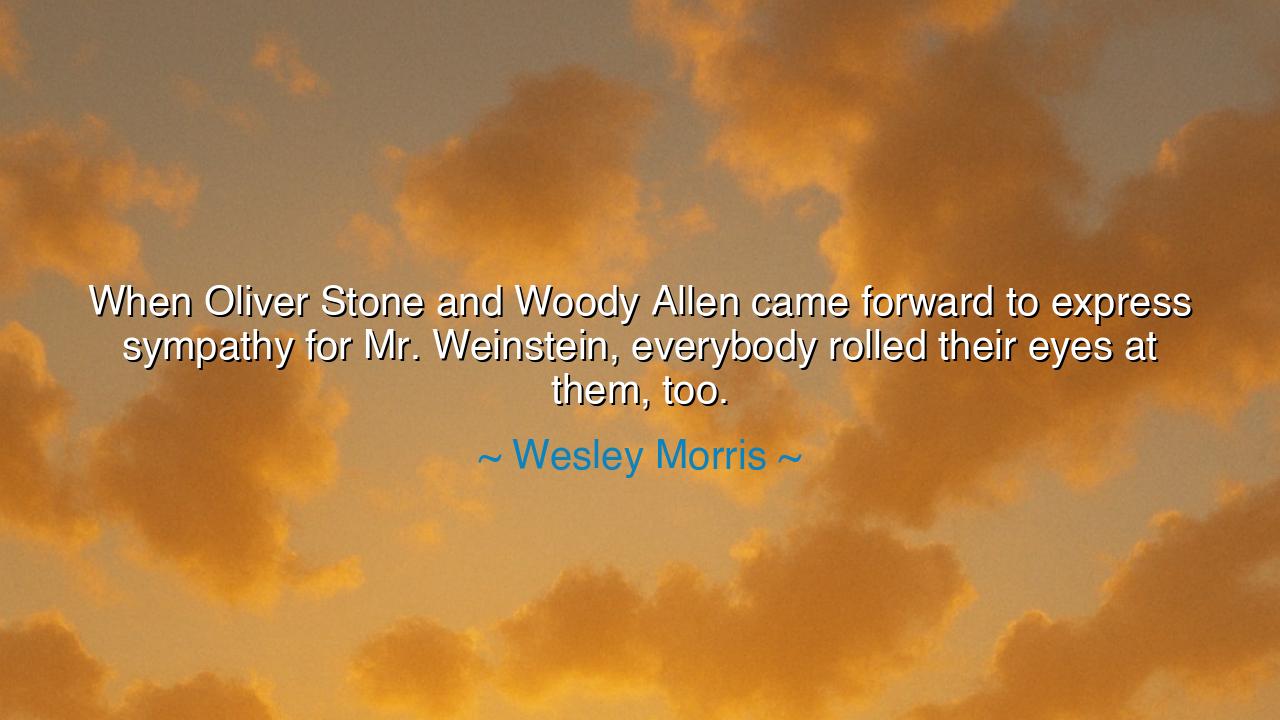
When Oliver Stone and Woody Allen came forward to express
When Oliver Stone and Woody Allen came forward to express sympathy for Mr. Weinstein, everybody rolled their eyes at them, too.






When Wesley Morris declared, “When Oliver Stone and Woody Allen came forward to express sympathy for Mr. Weinstein, everybody rolled their eyes at them, too,” he was not merely describing a moment in the unfolding scandal of Hollywood. He was speaking of a deeper clash between sympathy misplaced and the moral instincts of a society in revolt. For there are times when sympathy, that noble virtue, becomes corrupted—when it is offered not to the oppressed but to the oppressor, not to the wounded but to the wounder. In such moments, the crowd’s scorn is not cruelty, but the rightful judgment of a people who refuse to allow compassion to be twisted into complicity.
The name of Harvey Weinstein became, in his fall, a symbol of unchecked power wielded in darkness, of the silencing of voices, of women degraded and dismissed. When the tide of testimony rose, it was as if a great dam had burst, and the flood revealed not one man’s corruption but the hidden rot of an entire system. In such an hour, to extend sympathy toward the accused while the cries of the victims still echoed in the air was to turn one’s face from truth. This is why, as Morris observed, “everybody rolled their eyes.” It was the body politic declaring: your sympathy is blind, your compassion wasted, your words unworthy.
History too has known such moments. Recall the tale of Marie Antoinette, who, when told that the peasants had no bread, is said to have replied, “Let them eat cake.” Whether legend or truth, the phrase endured because it epitomized a misplaced response to suffering—compassion squandered, understanding absent. When leaders or artists of renown misalign their sympathy, they reveal their distance from the common heart, and the people, like those who rolled their eyes at Stone and Allen, rise in disdain.
Yet Morris’s quote is more than a critique of two men. It is a lesson in discernment. For sympathy is not an unqualified good; it must be rightly aimed. To show compassion to those who suffer injustice is to water the roots of healing. But to pour compassion upon the powerful who have inflicted wounds without repentance is to deny justice itself. Wisdom lies in knowing where mercy belongs, and when it must give way to accountability.
The lesson for you, O children of tomorrow, is to guard your compassion with discernment. Do not let it be manipulated by power, nor misdirected by fame. When the mighty fall for crimes of their own making, do not rush to cradle them in comfort while their victims bleed unattended. Compassion must always flow first to the wounded, to the silenced, to the ones who bore the cost of another’s cruelty.
Practical action lies here: when scandals and injustices erupt in your own age, pause and ask, Whose suffering cries out most loudly? Let your heart lean toward them, not toward those who held the whip. Listen to survivors, stand with the marginalized, and measure your sympathy not by habit or by celebrity, but by truth and justice. To misplace sympathy is to betray it; to direct it rightly is to transform it into strength.
Therefore, let Morris’s words echo as a warning: even those of renown may stumble into folly by offering compassion where it is least deserved. Do not follow them blindly. Learn to see with clear eyes, and to keep your sympathy holy, reserved for the broken and the oppressed. In this way, your compassion will be a sword of justice, not a veil for corruption, and you will walk the path of both mercy and wisdom.






AAdministratorAdministrator
Welcome, honored guests. Please leave a comment, we will respond soon